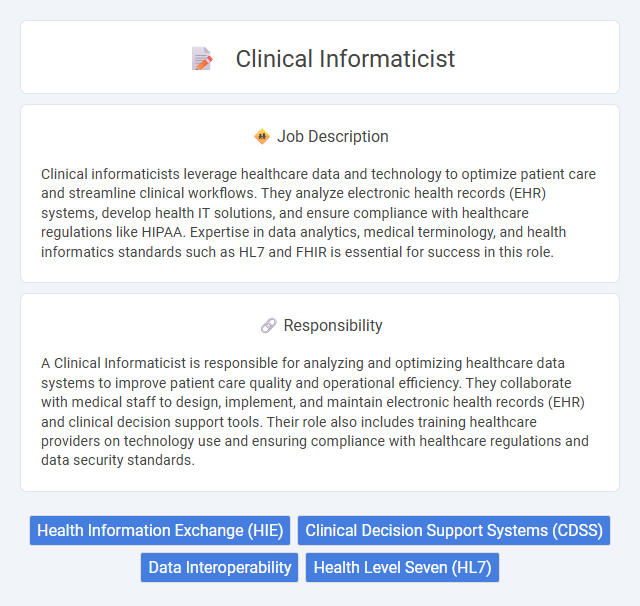
Clinical informaticists leverage healthcare data and technology to optimize patient care and streamline clinical workflows. They analyze electronic health records (EHR) systems, develop health IT solutions, and ensure compliance with healthcare regulations like HIPAA. Expertise in data analytics, medical terminology, and health informatics standards such as HL7 and FHIR is essential for success in this role.
Individuals with a strong background in both healthcare and information technology are likely to be well-suited for a Clinical Informaticist job. Those who possess analytical skills, attention to detail, and the ability to communicate complex data effectively may find this role aligns with their strengths. People who enjoy working collaboratively in clinical environments and adapting to evolving healthcare technologies probably have higher chances of success in this career.
Qualification
Clinical informaticists typically require a strong background in healthcare with qualifications such as a bachelor's or master's degree in health informatics, nursing, or a related field. Certification from recognized bodies like the American Medical Informatics Association (AMIA) or Certified Professional in Healthcare Information and Management Systems (CPHIMS) significantly enhances job prospects. Proficiency in electronic health records (EHR) systems, data analysis, and healthcare regulations is essential for effective clinical data management and decision support.
Responsibility
A Clinical Informaticist is responsible for analyzing and optimizing healthcare data systems to improve patient care quality and operational efficiency. They collaborate with medical staff to design, implement, and maintain electronic health records (EHR) and clinical decision support tools. Their role also includes training healthcare providers on technology use and ensuring compliance with healthcare regulations and data security standards.
Benefit
Clinical informaticist roles probably offer significant benefits, including improved patient care through the integration of clinical data and technology. They likely enhance healthcare workflows by optimizing electronic health records and supporting data-driven decision-making. These benefits may lead to increased efficiency, reduced errors, and better health outcomes across medical settings.
Challenge
Clinical informaticist roles likely involve navigating complex healthcare data systems that require precise interpretation and integration. They may face challenges in aligning technological solutions with clinical workflows to enhance patient outcomes without disrupting care processes. The probability of encountering rapid technological advancements means continuous learning and adaptation could be essential in this career.
Career Advancement
Clinical informaticists leverage expertise in healthcare data management and technology integration to improve patient outcomes and streamline clinical workflows. Career advancement often involves gaining certifications such as the Certified Clinical Informatics Specialist (CCIS) or progressing to leadership roles like Chief Medical Informatics Officer (CMIO). Mastery in electronic health record (EHR) systems, data analytics, and healthcare regulations significantly enhances promotion opportunities in this dynamic field.
Key Terms
Health Information Exchange (HIE)
Clinical informaticists specializing in Health Information Exchange (HIE) enhance interoperability between healthcare systems by managing and optimizing the secure exchange of patient data across providers. They utilize standards such as HL7 and FHIR to ensure accurate, real-time data sharing that supports informed clinical decision-making and improves patient outcomes. Expertise in regulatory compliance, data governance, and health IT infrastructure enables clinical informaticists to bridge the gap between clinical workflows and advanced technology integration.
Clinical Decision Support Systems (CDSS)
Clinical informaticists specializing in Clinical Decision Support Systems (CDSS) enhance patient care by integrating evidence-based guidelines into electronic health records (EHRs) to provide real-time, actionable insights for healthcare providers. Their expertise in data analytics, system design, and clinical workflows ensures CDSS tools improve diagnostic accuracy, reduce medical errors, and promote personalized treatment plans. Mastery of interoperability standards like HL7 FHIR and knowledge of user-centered design principles are crucial for optimizing CDSS functionality and clinician adoption.
Data Interoperability
Clinical informaticists specialize in enhancing healthcare delivery by optimizing data interoperability across diverse electronic health record (EHR) systems and health information exchanges (HIEs). They develop and implement standards such as HL7 FHIR and LOINC to ensure seamless data integration, facilitating real-time access to patient information for clinicians and improving care coordination. Expertise in data interoperability enables clinical informaticists to support evidence-based decision-making and advance population health management initiatives.
Health Level Seven (HL7)
Clinical informaticists specialize in implementing and managing Health Level Seven (HL7) standards to ensure seamless electronic health data exchange across healthcare systems. Proficiency in HL7 version 2.x and HL7 FHIR facilitates the integration of clinical workflows, improving patient care coordination and data accuracy. Expertise in HL7 messaging protocols supports interoperability, enabling real-time communication between electronic health records (EHRs), laboratory information systems, and other healthcare applications.
 kuljobs.com
kuljobs.com